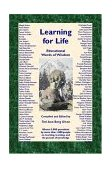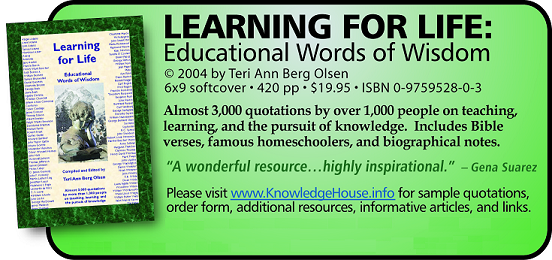

Not Just For KidsFamous Educators Some of the greatest authors, poets, scientists, and philosophers have been teachers. A teacher wrote the first children’s picture book and invented multimedia instruction – way back in the 17th century! At least one educator doesn’t believe in “teaching.” The following influential people from throughout history have made significant contributions to education. Confucius (551-479 BC) was a Chinese philosopher who stressed self-improvement and education as a focal point in shaping people’s lives. Plato (c. 428-348 BC) was a Greek philosopher who founded what is said to be the first university. He believed that teachers should know their subject and care about their student. Aristotle (384-322 BC) was a tutor, philosopher, and scientist who promoted a balanced life incorporating music, play, debate, science, philosophy, and physical training in developing the whole body, mind, and soul. Jesus (c. 5 BC- c. 30 AD) was a Master Teacher who made teaching and learning a part of daily life. His brief, informal lessons, which often made use of parables and proverbs, challenged the pupil to think or take action. Desiderius Erasmus (c. 1466-1536), a Christian scholar during the Renaissance, believed that all subjects should be subordinate to the classics. He devoted himself to the spread of learning by urging study of the literature and language of ancient Greece and Rome. Johann Amos Coménius (1592-1670) thought that humans are born with a natural craving for knowledge and that schools beat it out of them. He explored lifelong education, dividing learning into stages from infancy through the university and beyond. He wrote the first children’s picture book and proposed multimedia instruction to make learning more interesting, dramatic, and stimulating. John Locke (1632-1704) believed that education is essentially a training of character rather than simply rote instruction in knowledge – to prepare for life, rather than for the university. Johann Pestalozzi (1746-1827) emphasized the total development of the child– physical, mental, social, and emotional– and criticized traditional schools for stressing the mental or academic aspects of education while neglecting the rest. Friedrich Fröbel (1782-1852) founded the first Kindergarten (“garden of children”) which focused on growing young minds through self-expression and creativity, while using manipulative materials to learn mathematical concepts such as geometry, shape, color, structure, and pattern. Horace Mann (1796-1859) was a Massachusetts lawyer and legislator who, having been raised in poverty and hardship, came to believe in social harmony and the need to win “some victory for Humanity.” Thus, though self-educated himself, he became “the Father of the American Common School” which he intended to be “the great equalizer of men.” Harriet Martineau (1802-1876) stated that “in the father’s house and under the mother’s eye” the child receives the important lessons which decide the character and ability of the future man. She thought that the young and old should be educated together; and that freedom and rationality, rather than command and obedience, are the most effective instruments of education. Ralph Waldo Emerson (1803-1882) addressed a radical rethinking of the relationship between education and culture, viewing knowledge not as the end product of a preexisting truth, but seeing learning as a continuous process—a perpetual journey relating the self to the world. Henry David Thoreau (1817-1862) was a schoolteacher who believed that children should not have to study exclusively from texts. He created a curriculum that included journal writing (rather than just memorization and recitation) and field trips (to the countryside for nature study, as well as to the local newspaper office, gunsmith, etc.). Although he ended his classroom career early to spend the rest of his life learning and writing, he continued to reflect on the process of teaching and was a pioneer in adult education. Charlotte Mason (1842-1923) believed that “education is an atmosphere, a discipline of habit, a life.” She advocated a down-to-earth philosophy highlighting the home, books, and the outdoors; and she encouraged parents to nurture their children with a “living” education. Anne Sullivan (1866-1936) was a devoted teacher who, despite her own handicap, demonstrated a tireless commitment to a student (Helen Keller) who had severe learning disabilities. She developed a method of touch teaching, using direct experience rather than attempting to explain a concept; and she reasoned that children learn by imitation and repetition, working out their own understanding of the subject. Maria Montessori (1870-1952) believed that each child is born with a unique potential to be revealed, rather than a “blank slate” to be written upon; that learning requires a stimulating environment which engages all the senses; and that the teacher’s role is primarily in organizing materials and establishing a general classroom culture. Robert Frost (1874-1963), the famous American poet, was a college teacher who taught his own children at home. He believed that education should both delight and instruct. His approach favored involvement and enjoyment rather than scholarship and criticism. Jean Piaget (1896-1980) brought the theory of knowledge out of the realm of philosophy and made it into a science, by observing that children’s logic and modes of thinking are entirely different from those of adults; that they are constantly creating and testing their own theories of the world. John Holt (1923-1985) was a schoolteacher and educational reformer who coined the term “unschooling,” believing that children do not need to be coerced into learning. He thought they do so naturally if given freedom to follow their own interests and provided with a rich assortment of resources. Raymond Moore is an early child development expert whose research showed that too much time spent with peers at a young age causes peer dependency. He continues to advocate delayed formal schooling, emphasizing that the home is the best place for a young child to grow and develop a sense of self-worth. Howard Gardner developed the theory of multiple intelligences which accounts for a broader range of intelligences based on different ways people learn and think. Consider your favorite teacher: How is he or she different from others? What special methods does he or she use to make learning fun and interesting?
See Also:
* * * The above information is excerpted from Learning for Life: Educational Words of Wisdom, by Teri Ann Berg Olsen. For more information, or to order a copy, please click here. Learning for Life: Educational Words of Wisdom is also available on Amazon.com. Learning for Life: Educational Words of Wisdom, by Teri Ann Berg Olsen. Published in July 2004, 6x9” softcover, 420 pages, ISBN 0-9759528-0-3, $19.95.

ARIZONA | LEARNING FOR LIFE | PRODUCT CATALOG | LINK LIBRARY | ABOUT US | CONTACT
These pages are a continuous work in progress.
Visit my other website - www.ArizonaEdventures.com - click here to explore Arizona!
|
Sign up for my newsletter and get a FREE GIFT! Click here for details.
Thanks for your votes!
and purchase items via our affiliate links. Thank you!
 
|







 L
L K
K